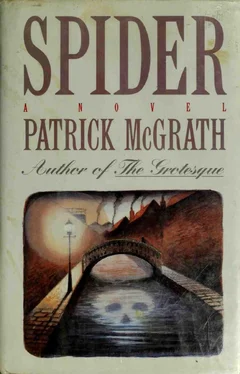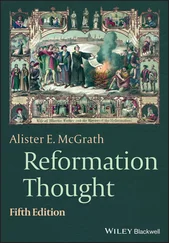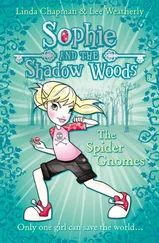It’s not hard, then, for me to see my father stamping off down the alley of an evening, after yet another unhappy meal in his own kitchen, and imagine what he was thinking. I wonder if he ever contemplated the idea of simply going down the Dog as he used to, avoiding the Earl of Rochester altogether, avoiding Hilda Wilkinson altogether, quietly subsiding into his old life which, narrow and constricted though it was, promised at least the mild benefits of predictability, and a sort of harmony? He did not, of course; only a wistful nostalgia could resurrect his old life, his life before Hilda; he had felt too often her breasts beneath his hands, the softness of her belly pressed against his own, best of all the sheer giddy euphoria of her fingers fumbling at his fly buttons—and as the memory of these sensations flooded him he stiffened, even as he strode forward, in his trousers, and all doubt, all wavering, vanished. The thing was beyond his control.
There was one night in the Rochester that I remember very well. It was a bloody awful night, made more bloody than it need have been because my father was still stewing in the bad feeling he’d carried away from Kitchener Street with him. He seemed more ill at ease than usual as he sat there among Hilda’s people, amid the gilt and mirrors of the big busy pub, and I wonder if he didn’t see one of the regulars from the Dog come in—this would have caused him anxiety, I know, the thought that Ernie Ratcliff would hear about this, Ratcliff a man who loved gossip and slander above all else. So there he sat, for more than an hour, frowning and morose, and not even Hilda could warm him up. When they left the pub she was cool and haughty, she wouldn’t let him take her arm as they walked off together into the night. Going down an alley near Spleen Street (I was close behind them at this point, creeping silently through the darkness and black as a shadow) my father tried to push her up against the wall. She was having none of it! Oh, she turned on him then, and he shrank back from her—what a spitfire she was when her dander was up! Her eyes blazed. “Don’t put yourself out, do you, plumber?” she cried. “You don’t make much of a bloody effort, eh? I don’t know why I bother with you, sitting there all night like an undertaker—what is your problem then? Eh?” She was warming to it now, the chin was out, the coat was pushed back, hands on the hips of a straining skirt. My father had turned away and was facing up the alley, toward where I was crouched behind a dustbin. “Give it a rest, Hilda,” he said wearily, pulling out his tobacco.
“Give it a rest? That’s a laugh, coming from you. Give me a rest, plumber. Sit there all night like a bloody corpse and then want to feel me up down an alley. What’s your problem? Ain’t you been paid for the pipes yet?”
I saw him stiffen then, for this one cut him to the quick. At the other end of the alley the streetlamp cast splinters of light into the cracks between the cobblestones and along the edges of the bricks. Paid for the pipes? Paid for the pipes? Was that what it was all about? He’d had no cash from her for his work, he knew he’d never be paid—is that how she saw it, though, payment for services rendered? All color drained from him, he slipped his tobacco pouch back in his pocket. Hilda glanced at him, assumed an airy nonchalance, tossed her big chin. “That it, plumber? That the truth of it?” He stood there, white with rage, still with his back to her, and struggled to bring himself under control. He wanted nothing so much as to hit her very hard, this I could see, I knew that look—he wanted to hurt her really badly, hurt her as she’d just hurt him. “Come’ere, plumber,” he heard her say.
He didn’t move.
“Come on, plumber.” A silky tone now. Sweet Hilda now. He turned. Coat still pushed back, hands still on her hips, she was leaning against the wall with one knee crooked so her skirt rode up, and she was grinning at him. “Come’ere,” she murmured. Over he went, meek dog he was. One hand still on her hip, with the other she clasped the back of his skull, drew him to her, kissed him softly on the mouth. His hands were on her thighs, working the skirt up; suddenly he was inflamed, overwhelmed with desire for the woman, he wanted to have her now, this moment, up against this wall, he was stiff in his trousers and already fumbling with the buttons, he was blind and panting with passion—but Hilda, still kissing him, reached down, took hold of his wrists, pushed his hands off her, broke away from him. She laughed once, quite hoarsely, and with a shiver closed her coat. “No more, plumber,” she said, catching his wrists as he came crowding in on her again, “I’m off home.” My father began whispering furiously, again reached for her, was again pushed away. Then I saw her put her hand on his cheek. “I’m off home,” she said again, “it’s cold out here. Goodnight, plumber”—and shaking her head as he tried for the last time to hold her, she slipped away, went swaying down the alley toward the light, leaving my father in a heated confusion of anger and desire, a very flux of contradictory emotion.
Hilda was a prostitute, you see. She was a tart, and she paid my father with the services of a tart, though he didn’t realize it until that night in the alley. When he got home half an hour later—he had smoked a cigarette by the canal, despite the cold of the night—he found to his annoyance that my mother was waiting up for him. I heard his boots in the yard, and then I heard him come in through the back door. My mother was sitting at the kitchen table in the dark, with a cup of tea, and he did not see her until he switched the light on. Her face, as she turned toward him, was puffy around the eyes, the way it got when she had been crying. “Still up?” he muttered as he sat down heavily at the other end of the table and bent to unlace his boots. He could not look at her.
“Where have you been, Horace?” she said quietly. There was a trace of accusation in her voice, accusation tempered with misery. The door from the kitchen into the passage was open, so I crept out of bed (I’d only been home a short while myself) and sat at the top of the stairs, in my pajamas, to listen. Did my father, even at this stage, have any decency at all left in him? Did her unhappiness catch at his heart and tear him, tear him between an involuntary spurt of compassion for my mother, for whose pain he alone was responsible— and his intense irritation with her, not only because she was a hindrance to him in his tawdry affair with Hilda Wilkinson but also because she complicated the clean hard thrust of his desire? His heart was not yet completely turned to stone, I believe; she aroused in him still, I think, traces of the responsibility he’d once felt for her, but the guilt triggered by these feelings he was forced violently to suppress, and for one simple reason: he could maintain his lust for Hilda only if he simultaneously hardened himself against my mother—if, in other words, he made a sort of unnatural compartmentalization of his emotions: the only alternative was to flounder about in muddle and indecision, a flaccid, unmanly condition he was anxious to avoid. So while one tiny voice cried out to him to comfort my mother, to wipe away the tears from those bleary eyes, take her in his arms and make everything all right again—an opposite and equal impulse told him to make her suffer, intensify the crisis, provoke the breakdown and dissolution of whatever frayed bonds still held them together. So he did not comfort her, he set his jaw in a thin, hard line, pulled off his boots, one by one, and rubbed his feet. “Down the pub,” he said.
“Down the Dog?”
“Yes.”
“Liar! You’re a liar, Horace!” she cried. Oh, it was hard for me to hear her voice cracking like that, she such a stranger to anger! “I went down the Dog and you weren’t there!” Now she was sitting upright at the end of the table with the tears streaming down and a sort of watery light gleaming in her eyes, fury and misery combined.
Читать дальше












